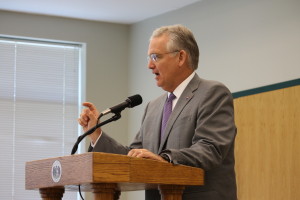
(Photo by IAN ROSS, digitalBURG) Gov. Jay Nixon speaks to residents gathered at the Warrensburg Senior Center Tuesday afternoon about his veto of House Bill 253.
(WARRENSBURG, Mo., digitalBURG) — Gov. Jay Nixon was greeted by a standing ovation entering the Warrensburg Senior Center Tuesday afternoon. The building was filled with senior citizens and caretakers eager to hear him speak.
Nixon was in Warrensburg to discuss the reasoning for his veto of House Bill 253, a bill that would place a tax on Missourians who use prescription drugs by a total of $200 million a year.
“I think he’s going to touch on the stuff with the senior citizens which we are all interested in at this point in life,” said Dorothy Golson, a Warrensburg local and senior center member who waited for the governor’s arrival since the morning hours.
And that’s exactly what he did. Nixon explained the bill would cause citizens to pay a new tax, up to 10 percent in some communities, on medications helping chronic diseases such as high blood pressure and diabetes.
“Since 1979, Missouri has exempted prescription drugs from state-wide sales tax,” Nixon said. “This bill eliminates that completely…. [It’s] a huge tax increase that Missourians cannot afford and don’t deserve.”
Some members of the Missouri General Assembly, though, have expressed their intent to override the governor’s veto in early September. This override will give special breaks to lobbyists and lawyers, and poses a threat to public services such as education and public safety.
This bill not only affects senior citizens, but college students, too. HB 253 would increase taxes on college textbooks by 7 to 11 percent statewide.
In addition, if the bill’s veto is overridden, Missouri will have to make cuts to public schools and institutions of higher learning.
Among those in attendance at the senior center was University of Central Missouri President Chuck Ambrose, who emphasized the large impact the bill would have on UCM if the governor’s veto is overridden.
“If the state loses $1.2 billion in revenue and UCM loses $250 million additionally in revenue, we’ll be beyond our breaking point,” Ambrose said.
“The stakes for education are very high,” Ambrose continued. “We’re operating at a very precise fiscal efficiency, which with the economy improving, with state revenues improving, there’s an opportunity for us to actually have more dollars to help us do what we’re doing better. But this is not the way to get us there.“
The governor has been traveling throughout the state, from Kansas City to St. Louis, to address the effects of the bill. Everywhere goes, his message is the same: Keep Missouri a low-tax state.
“Now is just not the time to reach into the pockets of our most vulnerable citizens and make it harder for them to make ends meet,” he said.



Leave a Reply